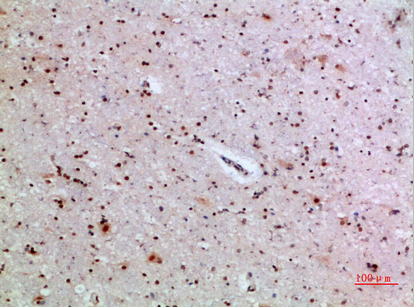IL-1F6 Polyclonal Antibody
- Catalog No.:YT5972
- Applications:IHC;IF;ELISA
- Reactivity:Human;Mouse
- Target:
- IL-1F6
- Fields:
- >>Cytokine-cytokine receptor interaction
- Gene Name:
- IL36A FIL1E IL1E IL1F6
- Protein Name:
- Interleukin-36 alpha (FIL1 epsilon) (Interleukin-1 epsilon) (IL-1 epsilon) (Interleukin-1 family member 6) (IL-1F6)
- Human Gene Id:
- 27179
- Human Swiss Prot No:
- Q9UHA7
- Mouse Gene Id:
- 54448
- Mouse Swiss Prot No:
- Q9JLA2
- Immunogen:
- The antiserum was produced against synthesized peptide derived from the Internal region of human IL36A. AA range:21-70
- Specificity:
- The antibody detects endogenous IL-1F6
- Formulation:
- Liquid in PBS containing 50% glycerol, 0.5% BSA and 0.02% sodium azide.
- Source:
- Polyclonal, Rabbit,IgG
- Dilution:
- IHC 1:50-200, ELISA 1:10000-20000. IF 1:50-200
- Purification:
- The antibody was affinity-purified from rabbit antiserum by affinity-chromatography using epitope-specific immunogen.
- Concentration:
- 1 mg/ml
- Storage Stability:
- -15°C to -25°C/1 year(Do not lower than -25°C)
- Other Name:
- Interleukin-36 alpha (FIL1 epsilon;Interleukin-1 epsilon;IL-1 epsilon;Interleukin-1 family member 6;IL-1F6)
- Background:
- The protein encoded by this gene is a cytokine that can activate NF-kappa-B and MAPK signaling pathways to generate an inflammatory response. The encoded protein functions primarily in skin and demonstrates increased expression in psoriasis. In addition, decreased expression of this gene has been linked to a poor prognosis in both hepatocellular carcinoma and colorectal cancer patients. [provided by RefSeq, Nov 2015],
- Function:
- miscellaneous:Binding analysis failed to detect interaction with multiple IL1R family members.,online information:Interleukin-1 entry,similarity:Belongs to the IL-1 family.,tissue specificity:Expressed in immune system and fetal brain, but not in other tissues tested or in multiple hematopoietic cell lines.,
- Subcellular Location:
- Cytoplasm . Secreted . The secretion is dependent on protein unfolding and facilitated by the cargo receptor TMED10; it results in protein translocation from the cytoplasm into the ERGIC (endoplasmic reticulum-Golgi intermediate compartment) followed by vesicle entry and secretion. .
- Expression:
- Expressed in immune system and fetal brain, but not in other tissues tested or in multiple hematopoietic cell lines. Predominantly expressed in skin keratinocytes but not in fibroblasts, endothelial cells or melanocytes. Increased in lesional psoriasis skin.
- June 19-2018
- WESTERN IMMUNOBLOTTING PROTOCOL
- June 19-2018
- IMMUNOHISTOCHEMISTRY-PARAFFIN PROTOCOL
- June 19-2018
- IMMUNOFLUORESCENCE PROTOCOL
- September 08-2020
- FLOW-CYTOMEYRT-PROTOCOL
- May 20-2022
- Cell-Based ELISA│解您多样本WB检测之困扰
- July 13-2018
- CELL-BASED-ELISA-PROTOCOL-FOR-ACETYL-PROTEIN
- July 13-2018
- CELL-BASED-ELISA-PROTOCOL-FOR-PHOSPHO-PROTEIN
- July 13-2018
- Antibody-FAQs
- Products Images

- Immunohistochemical analysis of paraffin-embedded human-brain, antibody was diluted at 1:200



